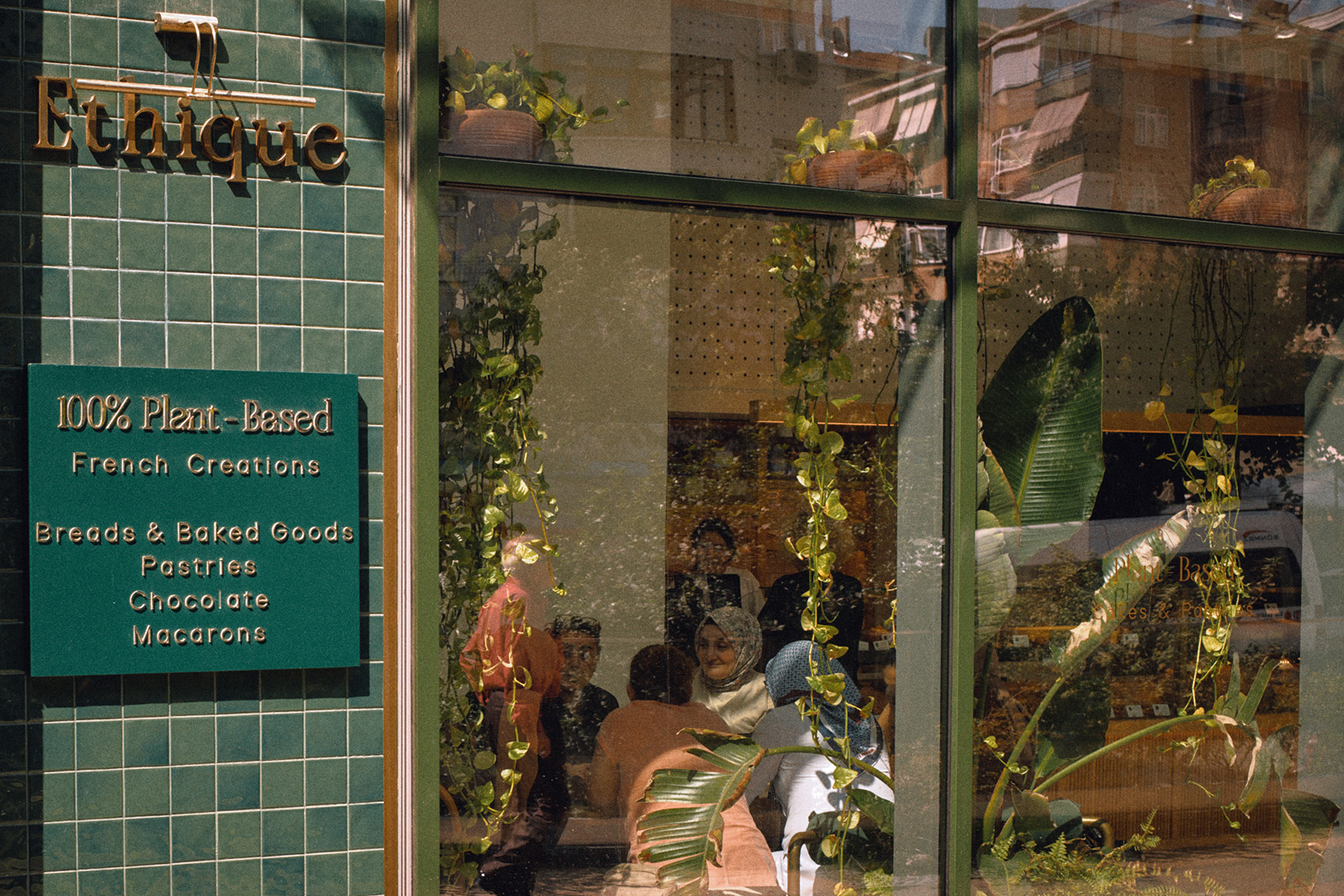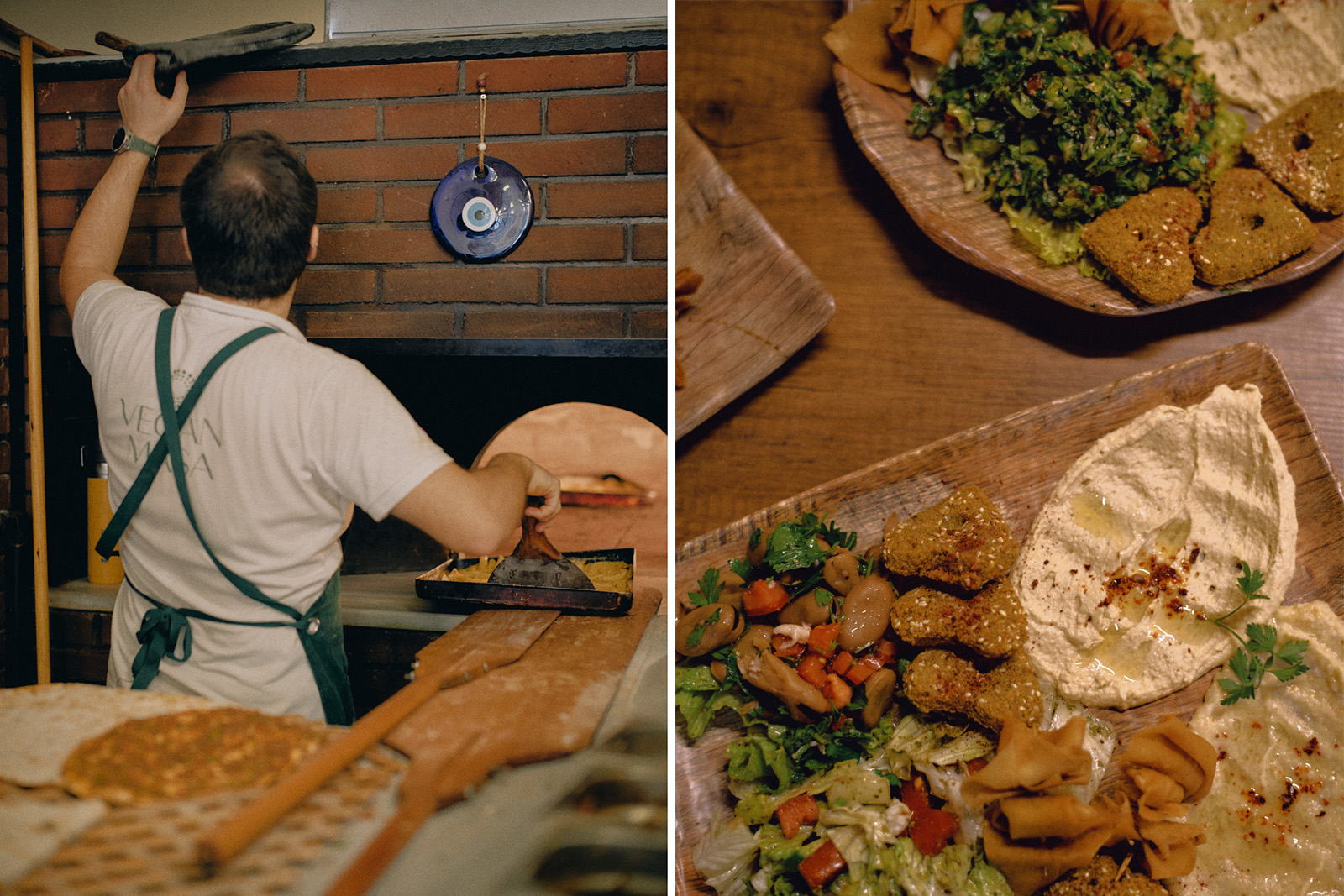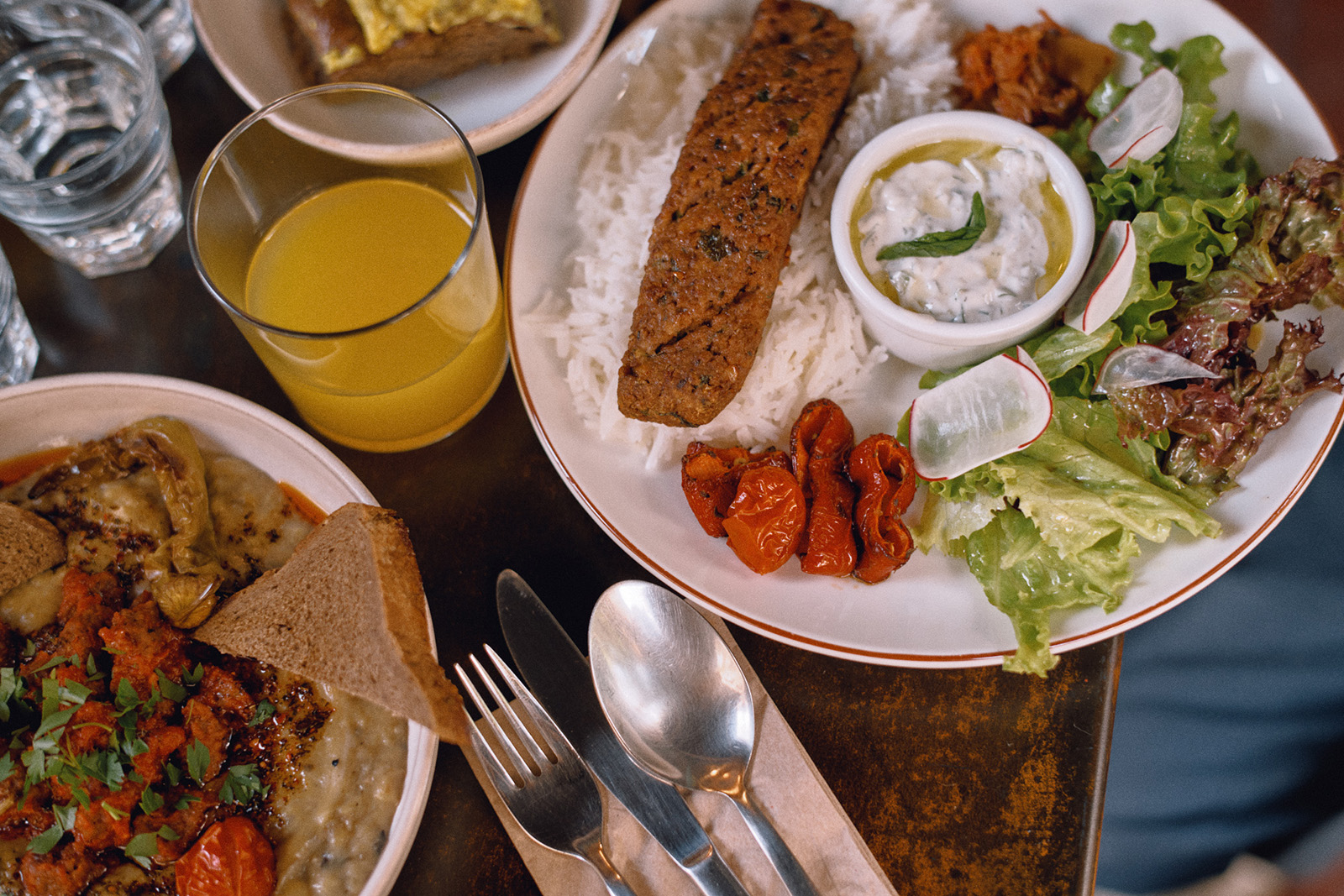Veganism finds a foothold in the land of the kebab
In Istanbul, a surging vegan food scene offers everything from French patisserie to hipster burgers
–

The smell of barbecue smoke wafts through the cobbled streets of Fatih, Istanbul’s old town, an ever-present companion as we weave through storied bazaars and along boulevards lined with Ottoman-era wooden buildings, crumbling Byzantine brick houses and ancient obelisks. Dotted across the city’s many bridges, fishing lines extend down to the Bosphorus Strait, angling for bluefish and mackerel. On every street corner, beloved semi-feral cats gnaw at fish bones or dry kibble.
Istanbul – once capital of the Holy Roman Empire and still a bridge between east and west – does not, at first glance, feel a particularly good place for vegan food. But with 26 exclusively vegan restaurants and 36 vegetarian restaurants, according to Happy Cow, veganism is definitely on the rise here.
Off a bustling high street in Besiktas, crowds fill the tables of Vegan Masa, a traditional wood-fired Turkish kitchen. Owner Funda Özdem opened her doors three years ago, though she is not new to the vegan hospitality scene. For the past decade she’s been hosting and catering vegan picnics on both sides of the strait, and has noticed growing demand for meat-free food. “Eight years ago, eight people came,” she says. “Last summer, 200. We realised [there weren’t] enough products to meet the demand.”
We order the mixed plate for two and purple basil iced tea. The drink is refreshing in the late summer heat, the herbal sweetness tempered by cinnamon, cloves and lemon. Özdem brings fresh condiments to the table: sliced tomatoes with lemon, parsley and sliced onion, and shredded lettuce. This is followed by a plate of pide filled with soya mince and cheese, and another with mushrooms; lahmacun, a thin, crisp pizza-like flatbread topped with soya sujuk (spiced sausage), peppers, onions, tomatoes and spices; and bulgur and soya mince kibbeh. All come straight from the wood-fired oven.
Also popular is the cashew-based ayran, a yoghurt drink too salty for our palates. For dessert we share the kazandibi, a caramelised milk pudding served with almond ice-cream, and incir uyutmasi, a cold milk pudding naturally sweetened by native figs.
Chefs Mustafa Potur and Lütfü Özdem, whose father was a baker, knead dough and load and unload the oven. On planning their menu, Potur says they wanted to recreate the experience of going to a traditional Turkish eatery. Eventually they landed on around 15 simple recipes.
“It is so unnecessary using animals to make traditional foods,” says Funda Özdem, who became vegan because she likes animals. Most of Vegan Masa’s 14-person crew have now transitioned to veganism too. “Some of us are atheist, some Muslim, others Christian,” she says. “We’re a diverse team.”
Earlier that morning we’d taken a 20-minute taxi ride from our hotel in historic Sultanahmet to Kadıköy on the Asian side of the strait, an area equivalent to Hackney in east London, known for its vegan cafes and restaurants. We came to visit Ethique Plant-Based Patisserie, a beautifully furnished French pastry shop that feels like a greenhouse with its large windows, houseplants and sunny terrace.
The counters displayed an array of vegan macarons, chocolate-dipped madeleines, stuffed croissants, brioches and sourdough. It was difficult to choose from the many offerings. “The Fuji is popular,” said manager Ebrar Elmas, pointing at a green, eclair-like pastry that balanced rich pistachio with raspberry and vanilla. “People also come for the artisanal sourdough bread, the gluten-free bread, the crunchy pistachio roll — that is my favourite.”
We ate croissants filled with tofu and harissa paste and an incredible tarte-aux-roses of patisserie cream, lychee jelly, rose jam and fresh raspberries — Turkish delight meets summer in south-east Asia and breakfast by the Seine. In the coming days we returned several times to sit on the terrace, local cats curled up beside us. I tried the crunchy pistachio roll, a laminated pastry filled with custard, jam and pistachio paste, and decided that if I could eat it every week, I would.
Ebrar told me that Engin and Aslı Sancaktaroglu, a married couple, opened Ethique two years ago with a mission to make food that is “good for your soul”. Head chef Aslı is Muslim and sees her faith and lifestyle as compatible. She learned to make pastries at the prestigious Cordon Bleu school in Paris, infusing her bakes with local flavours such as pistachio, rose and fig, but also drawing inspiration from her travels. The mango sticky rice pastry, inspired by the Thai pudding, was a stand-out.
“A plant-based diet is better for nature, your health and for animals,” says Ebrar. “You save a lot of things by eating vegan.”

This tallies with what Tugce, a theologist and volunteer at the city’s famous Blue Mosque, tells me back in Fatih as we discuss human and animal relationships. Islam, she emphasises, fosters a respect towards nature: “[Animals] cannot speak up – we have to speak up for them.”
The prophet Muhammad, she says, did not eat much meat in his lifetime and ruled that you cannot hurt animals when you slaughter them. The mosque takes great care to look after animals, feeding stray cats who wander into the complex, and employing a novel, humane way to repel insects so worshippers avoid unwittingly killing them. Placing the broken shells of ostrich eggs around the mosque thresholds, they say, keeps unwanted visitors away.
Also in Kadıköy, we eat at Kumin Vegan Lezzetler, a restaurant specialising in simple but well-cooked Anatolian and Mediterranean dishes. The quiet private room and secret garden offer reprieve from the chaotic surrounding neighbourhood as we savour wholesome moussaka and gnocchi with fresh tomato sauce, both paired with sweet sharbat, a drink prepared from a herb or flower-based syrup – here basil – followed by apple pie with almond ice-cream.
On another day we find ourselves extremely hungry on the Asian side of the water, and eat at Vatka, a hip vegan burger joint off a quiet street in the Moda neighbourhood. The Mexican black bean burger and thin-cut fries hit the spot, as do the minty falafel served with a drizzle of tahini and spicy sauerkraut. Afterwards, we take a stroll through the area, passing modern boutiques and coffee shops, and end up in a quiet park overlooking the Bosphorus Strait, drinking up the last beat of summer.
Another place we return to frequently is Vegan Dükkan Lokanta in trendy Cihangir. Everywhere in Istanbul is full of cats, but Cihangir, in particular, seems to have become a home for them. Three join us as we dine. The Turkish ravioli, better known as manti, stuffed with green lentils and topped with tangy cashew yoghurt, tomato sauce and herbs, is by far our favourite savoury dish.

I cannot stomach the adana kebab – a veganised version of a local favourite that swaps seitan for the usual skewered lamb, served with rice, tzatziki and salad. Having never eaten meat, I find the taste too similar to how I imagine it might be, based on its smell. We eat our meals with lemonade, made with both the juice and oil of the lemons, and finish with the best tiramisu we have ever eaten. The restaurant is next door to Istanbul’s first vegan shop, which is well-stocked with biscuits, tahini, cashew yoghurt, tofu, ice-cream, nut butter and other staples.
A 15-minute walk from the restaurant, we find Vegan Community Kitchen atop a hill, and down a flight of stairs. The atmosphere is comfortingly familiar and reminds me of 90s vegetarian restaurants in England: whole food-based, hearty and somewhat anarchic. Profits go towards feeding the street cats. The manti here are also delicious. We opt for ones stuffed with spinach, but they also come filled with sweet potato. They have run out of the brownie but offer us some local halva — my favourite sweet, made from sweetened and baked tahini. After eating we walk five minutes down the hill and find that classic Istanbul view of the 14th-century Galata Tower.
In Istanbul’s non-vegan eateries, eating vegan is a little harder but not impossible these days. In 2008, one of the most popular local foods — çiğ köfte — became accidentally vegan when the health ministry banned the inclusion of raw meat. Bulgar and spices are hand-pounded into a smooth paste, shaped into “meatballs” and served with raw onion, parsley and spices. While some establishments boast they are vegan, others stay quiet. Many locals, it seems, are unaware that meat has been removed from the recipe. One waiter in a restaurant near our hotel tells us adamantly: “It’s impossible. Çiğ köfte is minced meat.”
Naturally vegan falafel and hummus are also staples here, but less seasoned than in nearby Syria and Lebanon. A number of Syrian eateries have opened in Istanbul in the past 10 years as refugees fled their homeland. After perusing the antique and boutique shops in Balat, a historic centre for the Jewish community and a bohemian neighbourhood known for its colourful wooden houses, we sit for a late lunch at Falafel Koy.
We order vegan banana cocoa milkshakes and two mixed plates, well-priced in a city of rapid inflation. While we wait, the owners show us pictures of their granddaughter who has just turned one. The space is still decorated for her first birthday with balloons and garlands. The plates come piping hot and generously portioned: crisp falafel, hummus, baba ganoush, fresh tabbouleh and fried pita. This is living, fresh and vibrant food, in stark contrast to the pide and dumplings we have mainly been eating, which were good but different. The owners, who left Syria 10 years ago, are a Muslim family and not vegan but are happy to say “our cuisine is vegan”.
Istanbul, with its layers of history, has always been a city in a state of perpetual transformation – invading territories and being invaded, and taking in diaspora. It feels that a new, greener and more diverse chapter is in the making for this city at the confluence between continents, cultures and ideas.
Topics
Get the Hyphen weekly
Subscribe to Hyphen’s weekly round-up for insightful reportage, commentary and the latest arts and lifestyle coverage, from across the UK and Europe
This form may not be visible due to adblockers, or JavaScript not being enabled.